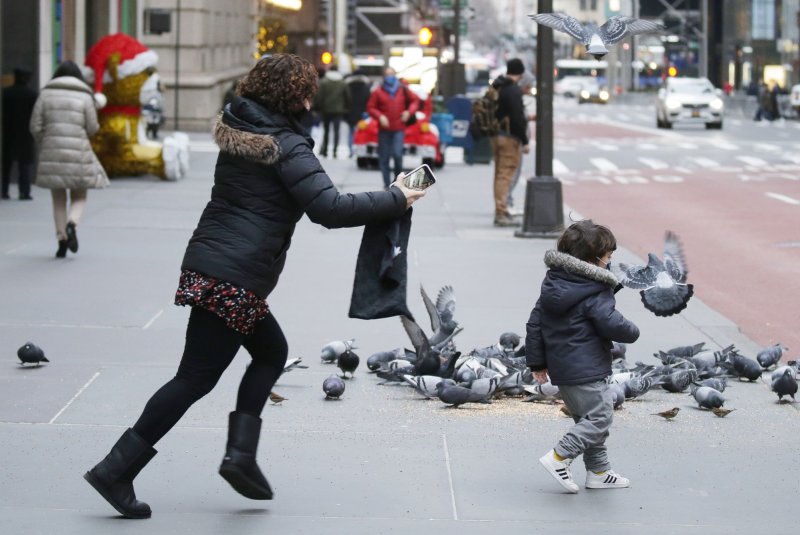Sen. Bernie Sanders sent a message late Monday to the Wall Street banks that are temporarily pausing their financial contributions to political campaigns amid public outrage over the role Republican lawmakers played in inciting the violent attack on the U.S. Capitol last week: Make the donation moratoriums permanent.
"If Wall Street really believed in defending our democracy, they would commit to never making another campaign donation—period," the Vermont senator tweeted in response to a Bloomberg report detailing how major U.S. financial institutions—including Morgan Stanley, Bank of America, JPMorgan Chase, Citigroup, and Goldman Sachs—are "reassessing, reducing, and in many cases suspending their campaign contributions."
"Corporations are trying to launder their reputations by temporarily suspending small PAC donations to insurrectionist Republicans—but the real cash fueling the radical right is dark money."
—David Sirota, The Daily Poster
According to Bloomberg, "Morgan Stanley singled out members of Congress who opposed the move to certify President-elect Joe Biden's election win, pausing its contributions to them. Goldman Sachs Group Inc. will probably curtail donations to leaders who tried to block the election result as well. JPMorgan Chase & Co. and Citigroup Inc. took a broader swipe, suspending all their donations for now."
Other large and profitable American corporations have similarly committed to adjusting their political giving in the wake of the mob attack, which was encouraged by Trump and abetted by Republican lawmakers who readily echoed the president's lies about the November election.
The companies' moves were met with skepticism from critics who warned that profit-motivated corporations are simply doing public relations to avoid being connected to seditionist lawmakers, not stepping back from influencing the political system out of genuine concern for the state of U.S. democracy.
"The banks and corporations that have annihilated our social fabric, toppled governments, polluted our environment, and exploited us are now trying to get some good PR by pausing their political donations," tweeted The Gravel Institute, a progressive think tank. "Their evil influence has not stopped in the slightest. Don't buy it."
As the New York Times pointed out Monday, the donation suspensions "coincide with the first quarter after a presidential election, which is typically light on fundraising anyway."
"Efforts by some companies to pause PAC donations to all lawmakers—those who voted to uphold the election as well as those who sought to overturn it—are raising eyebrows," the Times reported. "And companies can still give to 'dark money' groups that don't disclose their donors but often raise far more money than corporate PACs."
Emphasizing that point and outlining steps Democrats can take to curtail dark money, The Daily Poster's Andrew Perez and David Sirota wrote Monday that "if you are a billionaire or a corporation in America today, you can bankroll seditious politicians and the radical right-wing movement that staged last week’s violent insurrection at the U.S. Capitol—and you can do so with impunity."
"Right now, an increasing portion of resources flooding into politics is going into dark money groups that do not have to disclose their donors," Sirota and Perez noted. "OpenSecrets estimated that dark money groups injected more than $750 million into the 2020 elections—and that does not account for other dark money that funds propaganda, misinformation, and astroturf organizing."
While some companies provided specific timelines for their donation pauses, many did not specify how long the suspensions will last, leaving an opening for a quiet return to political giving in the near future.
"What would probably prove more significant for American elections would be if these donation bans become more permanent, or if corporations dissolve their PACs entirely."
—Theodore Schleifer, Recode
As Popular Information reported earlier this week, Dow Inc. vowed that its pause of "all corporate and employee political action committee (PAC) contributions to any member of Congress who voted to object to the certification of the presidential election" will "remain in place for a period of one election cycle (two years for House members; up to six years for senators)."
JPMorgan Chase, meanwhile, said its suspension of donations to both Republicans and Democrats in Congress will only last six months. Citigroup's pause of all political contributions will last only until the end of the current quarter.
Theodore Schleifer, money and influence reporter for Recode, argued Monday that "beyond the symbolism, the impact of these corporations' decisions could prove relatively minor."
"What would probably prove more significant for American elections," Schleifer wrote, "would be if these donation bans become more permanent, or if corporations dissolve their PACs entirely; if companies' billionaire executives and board members pledge to follow their corporate policies in their own disclosed and undisclosed personal giving; or if they fundamentally reshaped their lobbying strategies to not engage with GOP legislators or the entire Republican Party in Washington."
"Last week could serve as a broader reset in how big business approaches Washington," added Schleifer. "But the pause in corporate PAC giving would just be the beginning."
Facebook, Amazon, others halt political spending after Capitol riot

Marriott halted donations to Republican officials, such as Sen. Ted Cruz, R-Texas, (C) who voted last week against certifying President-Joe Biden's victory. Photo by Pat Benic/UPI | License Photo
Jan. 11 (UPI) -- Facebook and Amazon are among the companies that have halted political donations in the wake of Wednesday's deadly U.S. Capitol riot.
A mob of supporters of President Donald Trump stormed the U.S. Capitol on Wednesday, delaying the count of the Electoral College votes to certify the election results. The count was completed by early Thursday morning, affirming President-elect Joe Biden's win. The insurrection left five people dead, including Capitol Police Officer Brian Sicknick.
"Following last week's awful violence in D.C., we are pausing all of our PAC contributions for at least the current quarter, while we review our polices," Facebook spokesperson Andy Stone said in a statement to Politico.
Axios first reported on Facebook halting political action committee contributions and reviewing its practices following the U.S. Capitol attack.
Amazon went a step further by announcing the company would no longer contribute to U.S. Congress members who voted to try to stop President-elect Joe Biden's confirmation of victory by Congress after rioters stormed the Capitol.
"The Amazon PAC gives to congressional candidates on a bipartisan basis based upon the interest of our customers and our employees," an Amazon spokeswoman said Monday. "Given the unacceptable attempt to undermine a legitimate democratic process, the Amazon PAC has suspended contributions to any Member of Congress who voted to override the results of the US Presidential election. We intend to discuss our concerns directly with those Members we have previously supported and will evaluate their responses as we consider future PAC contributions."
Marriott also announced a pause in donations to 147 Republican U.S. representatives and senators who voted against certifying Biden's win.
The halt was prompted by "the destructive event at the Capitol to undermine a legitimate and fair election," Marriott said.
The Blue Cross Blue Shield Association similarly said it would end contributions "to those lawmakers who voted to undermine our democracy."
American Express said in a memo to employees Monday, it would halt contributions to lawmakers who voted "to subvert the presidential election results and disrupt the peaceful transition of power."
Hallmark's political action committee asked for Sen. Josh Hawley, R-Mo., and Sen. Roger Marshall, R-Kan., to return their donations. The Hallmark PAC contributed $7,000 to Hawley's campaign and $5,000 to Marshall's over the last two years.
"Hallmark believes the peaceful transition of power is part of the bedrock of our democratic system, and we abhor violence of any kind," Hallmark spokesman JiaoJiao Shen said in a statement Monday. "The recent actions of Senators Josh Hawley and Roger Marshall do not reflect our company's values."
Similar to Facebook, Microsoft said in a statement Monday it would freeze all political contributions "until after it assesses the implications of last week's events."
Microsoft said it's common for it to halt "its donations in the first quarter of a new Congress, but it will take additional steps this year to consider these recent events and consult with employees."
According to Politico, other corporate giants have also recently announced they will halt all PAC contributions, including Goldman Sachs, JPMorgan Chase and Citigroup.
Tech companies in particular have faced criticism from Democratic lawmakers as Wednesday's riot at the U.S. Capitol was organized across online platforms and live streamed by rioters repeating Trump's baseless election fraud allegations.
Facebook and Instagram on Thursday banned Trump "indefinitely and for at least the next two weeks" until the "peaceful transition of power," to Biden is complete.
Twitter permanently suspended Trump's personal account Friday "due to the risk of further incitement of violence."
Parler, a social media site popular with Trump supporters, went offline early Monday following Amazon removing it from its web hosting service at midnight Sunday. Over the weekend, Google and Apple removed the Parler app from their application stores over failure to moderate posts inciting violence in the wake of the U.S. Capitol riot.at Trump golf course

The PGA of America has announced it is canceling an agreement to hold its 2020 championship at a property owned by President Donald J. Trump, who is an avid golfer. Photo by Ken Cedeno/UPI | License Photo
Jan. 11 (UPI) -- PGA of America announced it has canceled its plans to hold the 2022 PGA Championship at outgoing President Donald Trump's New Jersey golf course after his supporters stormed the Capitol last week.
In a statement, PGA of America President Jim Richerson said the board Sunday night decided to "exercise its right" to terminate its agreement to hold the 2020 PGA Championship at Trump Bedminster.
"It's become clear that conducting the PGA Championship at Trump Bedminster would be detrimental to the PGA of America brand, it would put at risk the PGA's ability to deliver our many programs and sustain the longevity of our mission," Richerson said in a video statement. "It was a decision made to ensure the PGA of America and the PGA professionals can continue to lead and grow our great game for decades to come."
The decision to pull Trump Bedminster as its hosting site followed the president's supporters storming the Capitol building on Wednesday, resulting in at least five deaths, including that of Capitol Police Officer Brian D. Sicknick, who died of injuries sustained in the assault, and of Ashli Babbit, a woman who was shot and killed by authorities after breaching the building.
In response, a spokesperson for the Trump Organization told ABC News that the PGA board was breaching its agreement, which has "no right to terminate."
"As an organization we have invested many, many millions of dollars in the 2022 PGA Championship at Trump National Golf Club, Bedminster," the spokesperson said. "We will continue to promote the game of golf on every level and remain focused on operating the finest golf courses anywhere in the world."
The decision by the PGA of America is not the first time a major golfing event was relocated from a property own by Trump, who is an avid golfer.
In 2016, the PGA Tour moved its World Golf Championship from Florida's Trump National Doral to Mexico City after the presidential candidate made inflammatory comments about Mexicans and immigrants.













